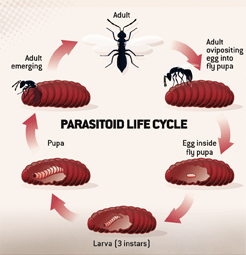Parasitic wasps can help control flies on poultry units

Controlling flies is a seemingly never-ending task, but it could prove easier with the use of parasitic wasps.
World health officials have often characterised the common house fly as the most dangerous insect for poultry in terms of spreading disease.
Salmonella has been found to be transmitted by flies and there is evidence that the brachyspira bacteria, associated with wet droppings and falls in production, are also found in fly droppings. On top of this, they are a nuisance to both staff and birds.
Traditionally, fly control has relied heavily on manure management and the use of various chemicals. Dry manure supports fewer flies and improving pit ventilation is essential to achieve this. But the need to wash houses to cut levels of salmonella brings the problem of wet manure and consequent exploding fly numbers.
Larvicidal products, which kill larvae, have greatly helped to reduce numbers, but there is mounting evidence that resistance is developing.
On some units, producers are applying them to manure 2-3 times a week during peak season to maintain control, and application in a pit house is not always easy and can be expensive.
Knock-down products also suffer from various forms of resistance and their high use in buildings containing birds has sparked concerns over residue in eggs. In broiler breeders, there is evidence that some are associated with drops in fertility.
Long-term chemical use also reduces the numbers of natural insect parasites. So, with few chemical options, poultry producers are in a difficult position.
In the long term, the only real effective control method is an integrated pest management system. This takes advantage of nature’s own predators and parasites and combines them with selective use of pesticides and other management systems.
Flies are prolific breeders, with an adult laying as many as 2400 eggs in a lifetime. Eggs hatch within 7-10 days. This means that even if chemicals kill the adult fly, the vast numbers of eggs left behind will still develop, continuing the cycle.
So the only effective control is to interrupt their breeding and destroy them before they emerge from the pupae. Predators and parasites do this to a large extent, unless numbers are out of control. In this case, the parasite cannot keep up due to its own limited reproduction capabilities. The average parasitic wasp lays 6-350 eggs a day and these can take from 2-3 weeks to mature depending on temperature and the species. For this reason producers need to supplement their numbers by adding insectary-reared (cultivated) parasites.
At the same time, reduction of adult fly numbers by selective and controlled use of knock-down chemicals can be used as long as long as it is not in the habitat of the predator wasp.

This means that the manure pit and any manure storage area can be treated with parasitic wasps while chemicals are used in the poultry house to control adult flies.
Fly maggots in manure spread on pasture will develop into flies unless parasitised and emerging adults will return to the poultry shed to seek out food. Equally, if the pupae spread with the manure on pasture are parasitised, the emerging wasps will live on the pasture and seek out more fly pupae to lay their eggs.
The female spalangia wasp attacks the most common species of flies which breed in animal and vegetable waste. They do not bother staff or other animals at all.
Once a wasp egg is deposited in a fly pupa, the parasite kills the fly and consumes the body as it develops into adulthood. An adult wasp emerges from the pupa and immediately starts breeding. Once the fly population is eliminated or severely reduced, the wasp population will also decline, as they have no hosts.
But fly migration from elsewhere will continue to supply new pupae. Cold winters will cut levels, but most poultry houses retain heat in the manure, so it is not uncommon for flies to be a nuisance throughout the year.
As the wasp’s lifecycle is slightly longer than the fly and it lays fewer eggs, it is essential to start supplementing wasps to the natural population while fly levels are low. In essence, this means that even during the winter in the UK, producers should be adding a low level of wasps to maintain control.
• St Davids Poultry Team is the UK poultry distributor for Kunafin wasp parasites and have been trained in their use.
Parasitic wasp benefits
- Reduces use of chemicals
- When using chemicals less frequently, their efficacy often improves
- Allows other insect predators to develop, such as beetles and red mite predators
- Over a period of time, the cost of fly control is reduced
- A non-chemical approach for organic farms
